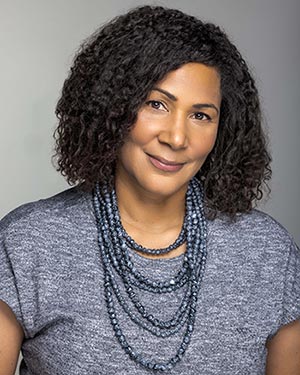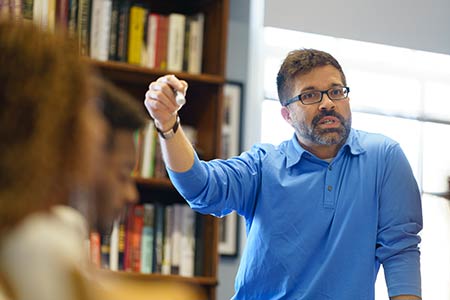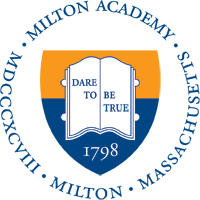Faculty and Staff
Milton’s New Dean of College Counseling
 This coming July, Milton Academy is delighted to welcome the school’s next dean of college counseling, Laurén Carter. Laurén’s career spans more than three decades in the college admission and counseling profession—with more than 20 of those years spent directing independent schools’ college counseling programs. As college admissions become more and more competitive, Milton’s college counseling office plays an increasingly critical role in supporting students in choosing the best college or university for them. The school couldn’t be happier to have Laurén joining to lead those efforts.
This coming July, Milton Academy is delighted to welcome the school’s next dean of college counseling, Laurén Carter. Laurén’s career spans more than three decades in the college admission and counseling profession—with more than 20 of those years spent directing independent schools’ college counseling programs. As college admissions become more and more competitive, Milton’s college counseling office plays an increasingly critical role in supporting students in choosing the best college or university for them. The school couldn’t be happier to have Laurén joining to lead those efforts.
Laurén presently holds the position of director of college counseling at Sidwell Friends School located in Washington, D.C. where she has implemented innovative college counseling programs, workshops, systems and structures, creating new pathways for educating and preparing both students and families for the college selection process. In addition to the seven years she has spearheaded Sidwell’s college counseling program, Laurén served as the associate director of college counseling at Episcopal High School in Alexandria, VA, (a 100% residential boarding school) where she contributed to the life of the school in various capacities including serving as a faculty member of the Discipline Committee, serving as a dorm faculty member and also founding, advising and mentoring an affinity group for African-American girls. Her previous experience includes serving as the director of college counseling at the Louisville Collegiate School in Louisville, KY, the Albany Academy for Girls in Albany, NY and Newark Academy in Newark, NJ. She also brings valuable higher education experience having served as director of college admissions at New York University (NYU) in Manhattan, NY and has additionally contributed in a variety of college admission roles while also at NYU, in addition to Manhattanville College in Purchase, NY and Ithaca College in Ithaca, NY.
As Milton’s focus on data-driven decision making continues to deepen, Laurén’s own experience in this area will ensure that data informs the office’s work, establishes accurate success measures and keeps the office abreast of emerging trends in this rapidly changing environment. At Sidwell, she regularly maintained and analyzed data to surface and report trends, growth areas, and new planning ideas that provided students with valuable information at every step in their college admissions process. Equally as important, Laurén also shares Milton’s deep commitment to diversity, equity, inclusion and justice work, and understands the importance of viewing college counseling systems, programs, and processes through the lens of equity. She has long provided guidance programs centered in student advocacy, access, equity, belonging, and inclusion, and promoted the values of community, diversity, and fairness. Under her leadership, the school is confident the college counseling office will continue to build on the great work it has already put in place in support of a wide range of student needs such as tailored guidance on college financial aid and counseling specific to first-generation college-bound students.
Laurén earned her BA in psychology from the University at Albany in Albany, NY. She also earned a master’s degree in school counseling (K-12) from New York University, as well as a certificate of advanced study (educational leadership and administration) from the College of Saint Rose in Albany, NY. She is also a member of the National Association of College Admission Counseling, the Association of College Counselors in Independent Schools and the National Association of Independent Schools. Laurén often shares her expertise with a broader audience and has served as a contributing writer for Huffington Post, a guest writer for Grown & Flown and in 2022 she authored the Amazon Best-Selling book, Mindful Admissions: An Insider’s Guide to Staying Sane, Applying Well and Getting Accepted to College. Laurén is a faculty member at the University of California, Los Angeles (UCLA), in Los Angeles, CA where she instructs courses for the college counseling certificate program and helps to educate and mentor aspiring college counselors.
Laurén will assume her new role on July 3, 2023 and the school is excited to welcome her to its community. She is known for her powerful communications skills, her collaborative nature and her tireless determination to support students and families—all qualities that will serve her well as she assumes leadership of the college counseling office. The school knows that she is excited to be joining a team with such deep talent and experience. In the coming months, Milton will share more information about opportunities for students, families, faculty and staff to get to know Laurén and learn more about her plans to build on Rod Skinner’s and the college counseling team’s solid foundation.
Why I Teach
History and Social Sciences teacher Matthew Blanton wants students to explore the stories we tell ourselves about ourselves.
 Besides the threat and loss COVID continues to perpetrate, it has also laid bare the power and need to be together. Milton’s faculty, staff, and students alike have drawn from untapped reserves to remain connected. These past few years, however, have made abundantly apparent that virtual classrooms cannot replicate the importance of brick-and -mortar spaces. By now, we are all more than aware that a mosaic of faces on a computer screen generates neither the chemistry nor the accountability that Harkness Table neighbors demand. Even if a mask hides a classmate’s nose and mouth, they can still contort their face or shift in their seat or let out an audible clue or input that’s abundantly legible from only a few physical feet away. This unspoken vernacular—nonverbal cues of human exchange too often lost on Zoom—undergirds our social contract of learning—a tangible part of the on-campus, community-making process.
Besides the threat and loss COVID continues to perpetrate, it has also laid bare the power and need to be together. Milton’s faculty, staff, and students alike have drawn from untapped reserves to remain connected. These past few years, however, have made abundantly apparent that virtual classrooms cannot replicate the importance of brick-and -mortar spaces. By now, we are all more than aware that a mosaic of faces on a computer screen generates neither the chemistry nor the accountability that Harkness Table neighbors demand. Even if a mask hides a classmate’s nose and mouth, they can still contort their face or shift in their seat or let out an audible clue or input that’s abundantly legible from only a few physical feet away. This unspoken vernacular—nonverbal cues of human exchange too often lost on Zoom—undergirds our social contract of learning—a tangible part of the on-campus, community-making process.
Past the pandemic horrors, how will historians look back on these years? At Milton specifically, what was it like for new students in the fall of 2021? How did they cultivate a sense of belonging? How did we collectively create community when it was so hard to be in community? What will our post-covid culture look like? These inquiries necessitate that we look to the past for guidance, and many of these concerns form the core underpinnings of what I ask students to contemplate in our history classroom. How did a particular society come into being? How is it bound? What factors contribute to its shape and function? Out of this structure, what realities emerge, and which ideologies do a people hold most dear? In their search for answers, students begin to differentiate between mythologies, facts, and truth, between the past and history.
My career as an educator did not begin as a historian. When I graduated college, I planned to take a quick break from studying before starting medical school. With a psychology major and premed requirements in hand, I began a one-year fellowship as a math teacher at a Connecticut preparatory school. A temporary layover became a six-year stint. I discovered that I love teaching. Numbers and equations? Less so. My favorite interactions with students involved grappling with thorny social issues. Ultimately, the long-term plan to become a doctor morphed into a peripatetic journey through graduate schools in African American studies and American studies. Eventually, I landed at Milton, where some of the foundational goals I try to achieve in my history courses mirror those I pursued when I taught the Pythagorean theorem or the chain rule: making kids feel better. In fact, that objective fueled my original inspiration to become a pediatrician. Fulfilling this possibility in the classroom is embedded far deeper in the mechanics of learning than in the achievement of prescribed outcomes. Prioritizing process invites us to partner our study of history with philosophical considerations of humanity. After we investigate a few basics —Who? What? When? Where?—we can interrogate how and why people of the past negotiated their circumstances as they did. This arrangement coheres nicely with Milton students’ steadfast curiosity. Their abiding question is often “How did it get like this?”
Somewhere within these explorations, students start to see that history consists of the stories we tell ourselves about ourselves. They begin to notice how power influences which stories we recall, even valorize. Later this year, my grandmother will turn 100. She has bequeathed to me invaluable accounts of her earliest years growing up in the Deep South just as her grandfather shared with her chronicles of his Mississippi childhood. Born into bondage in 1847, he began his life while James Polk occupied the White House, the ninth of 12 U. S. presidents to own people as property. Yes, 2022 is only a few grandparents’ grandparents away from slavery. How, then, does this conception affect our sense of the present? In my classes, I try to impress upon my students not just the relevance but the proximity of the past. I want them to recognize how various historical conditions intersect to determine people’s lived experience. While I certainly value content, memorization of easily “Googleable” facts is not what I emphasize. Besides grasping its details, for instance, how do students make sense of the significance of The 1619 Project? In the New York Times in 2019, the journalist Nikole Hannah-Jones spearheaded the historical endeavor that presented an alternative U.S. origin story. It provoked intense reactions, most notably from the White House, which denounced the work for “vilify[ing] our Founders and our founding.” The public outcry testifies to the importance we invest in how we remember the past.
All these dynamics motivate three symbiotic principles that govern my pedagogy. How can I help students make meaning from a particular history? How can I make it applicable? And what do I want students to take away? The fact that students in Milton’s Upper School hail from numerous states across the nation and from countries around the world complicates these questions in wonderful and necessary ways. To help reconcile some of this complexity, the historian William Cronon offers useful direction. He reminds us that memory lets us not only remember the past but also observe change over time and discern cause and effect. This insight, he asserts, enables us to be “moral agents.”
For our students, this conclusion defies individualism’s steady pull and empowers them to engineer the change they want to see. More specifically, it encourages them to imagine and create the communities they need, particularly as they each wrestle with worries about belonging. Just as Milton harbors its own history as an institution, each student possesses their own knotty, personal, multilayered “before.” How do they invoke this past—their history—in their “becoming”? Indeed, our histories inform our identities. How we negotiate and assert those identities within larger narratives of which we are a part remains an enduring question. Helping kids understand this about their world, their nation, their school, and about themselves—this is why I teach.

